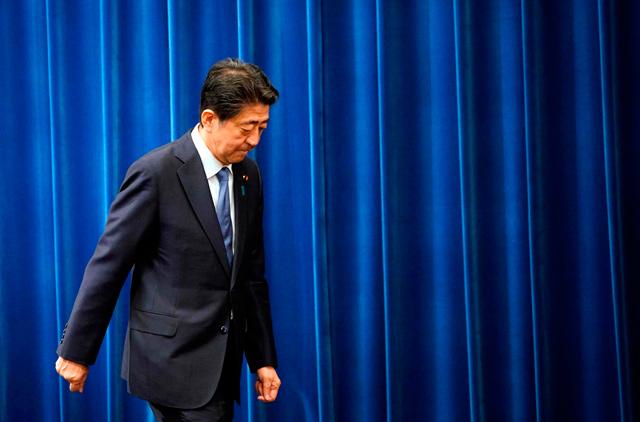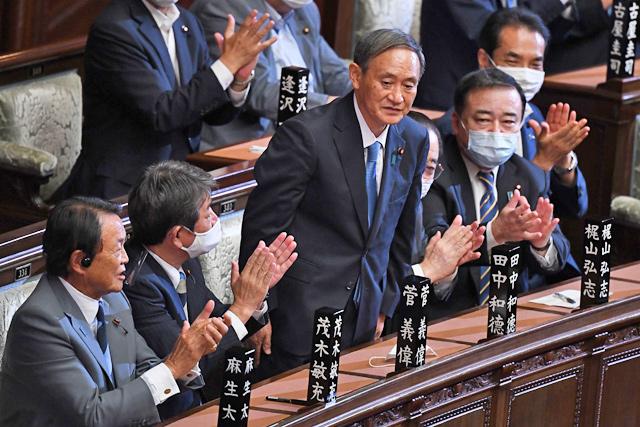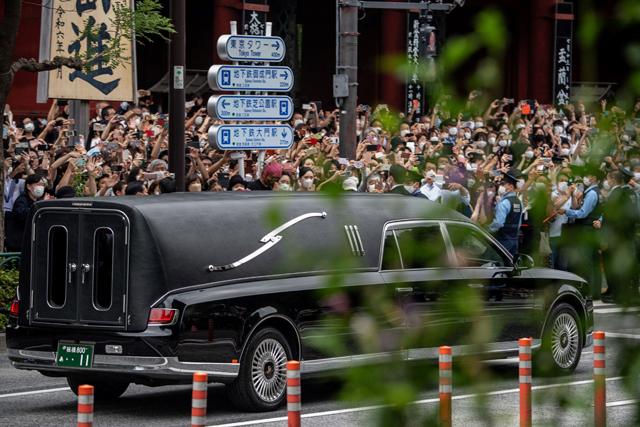You are here
Race for new Japan PM starts after shock resignation
By AFP - Aug 29,2020 - Last updated at Aug 29,2020

Japanese Prime Minister Shinzo Abe walks out at the end of his press conference at the prime minister official residence in Tokyo on Friday (AFP photo)
TOKYO — The race to succeed Prime Minister Shinzo Abe kicked off informally on Saturday, with several contenders announcing their plans to stand, a day after Japan's longest-serving leader announced his resignation.
Abe said he was suffering a recurrence of ulcerative colitis, the condition that forced him to cut short his first term in office, but that he would stay on until his successor is decided.
Exactly how the process will unfold was still unclear, with local media reporting on Saturday that several options were being considered.
Abe's ruling Liberal Democratic Party could opt for a more traditional leadership election, involving lawmakers but also members of the party nationwide.
But the urgency of the situation, as well as the constraints imposed by the coronavirus outbreak, could see the party instead opt to poll only its lawmakers and regional representatives — a faster process.
A decision on how the election will be held, and when, is expected early next week, along with more clarity on who will stand for the post.
A few would-be candidates have already thrown their hats into the ring, including party policy chief Fumio Kishida, a mild-mannered former foreign minister considered Abe's personal choice for successor, and ex-defence minister Shigeru Ishiba, who is seen as more popular with voters but commands less party support than some other candidates.
Finance Minister Taro Aso, himself a former prime minister and long considered a likely successor to Abe, has announced he will not stand.
Other possible candidates include powerful chief Cabinet Secretary Yoshihide Suga, viewed by many as a frontrunner, and current defence minister Taro Kono, a social-media-savvy former foreign minister who is seen as something of a longshot.
One woman is among those expected to stand so far: Seiko Noda, a former cabinet minister whose chances are thought to be slim.
Whoever comes out on top, analysts said, little major shift in policy is expected.
“Key policies — diplomacy and economic measures — won’t be changed drastically,” Shinichi Nishikawa, a professor of political science at Meiji University in Tokyo, told AFP.
“His successor could be a caretaker,” effectively, Nishikawa added, given that the LDP will hold another leadership election in September 2021, with general elections likely the following month.
Yoshinobu Yamamoto, an honorary professor of international politics at the University of Tokyo, said Abe’s successor would not produce any surprises but would face “big challenges”.
Most immediate will be the ongoing response to the coronavirus pandemic, with heavy criticism of Abe’s government so far for policies viewed as contradictory and slow.
But there are also diplomatic challenges on the horizon, including on relations with China.
Ties had been warming, but with rising tensions between Beijing and Washington and concerns domestically about issues including the coronavirus outbreak and the situation in Hong Kong, the next prime minister faces a balancing act.
Abe is also leaving office with the issue of the Tokyo 2020 Olympics still unresolved. The Games were postponed by a year over the pandemic and are now scheduled to open in July 2021, but questions remain about whether the event can be held safely.
And the next prime minister will inherit an economy that had swung into recession even before the coronavirus crisis hit and may face further hits if additional waves of infection force business shutdowns again this winter.
Tokyo markets slumped on Friday on news of Abe’s resignation but recovered slightly before the end of trade, and economists said disruption would be minimal because economic policy was not likely to change.
“We believe the current monetary easing policies and expansionary fiscal policies will continue for the duration of the Covid-19 pandemic,” wrote Naoya Oshikubo, senior economist at SuMi TRUST.
“Thus the impact on the market should be limited in the mid-to-long term.”
Related Articles
TOKYO — Yoshihide Suga became Japan's new prime minister on Wednesday, with the former chief Cabinet secretary expected to stick closely to
TOKYO — Shinzo Abe entered the history books as Japan’s longest-serving premier on Wednesday, but many of his ambitious goals, including a c
TOKYO — Mourners lined the streets of central Tokyo on Tuesday to bid farewell to assassinated former Japanese prime minister Shinzo Abe, as













